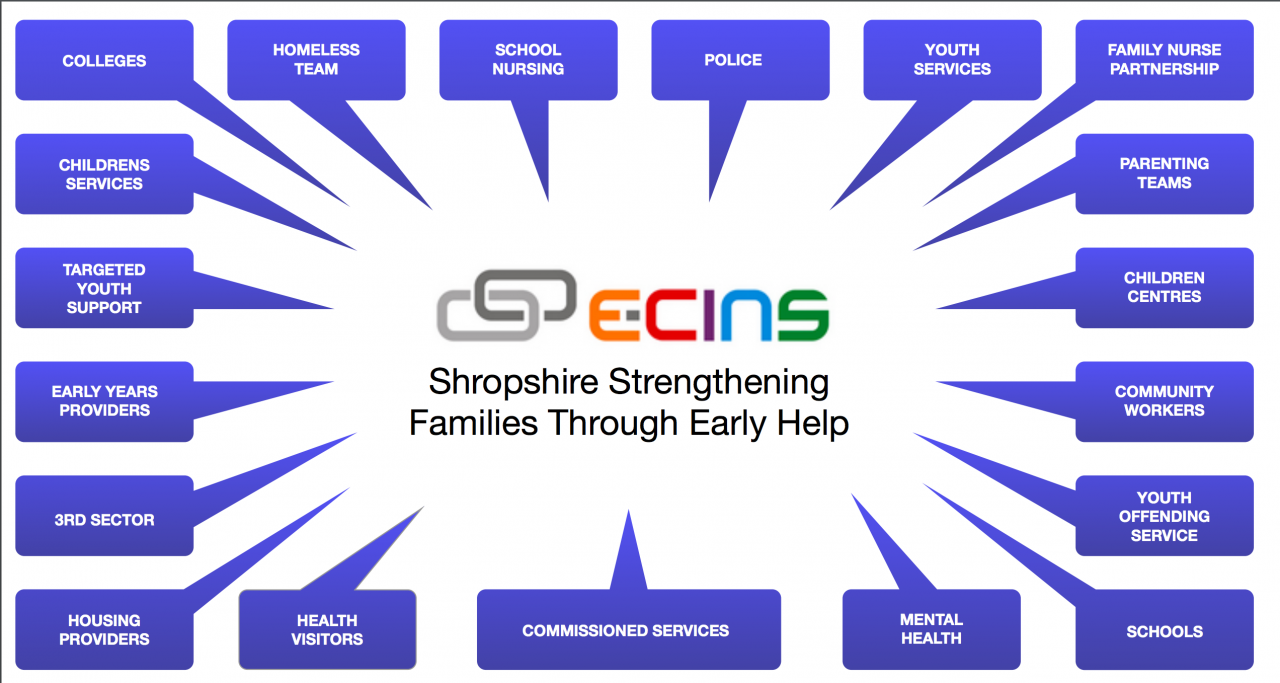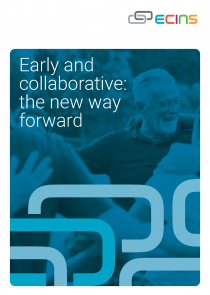Across Shropshire, partners are using ECINS to work together and share relevant information. The multi-agency approach, the training that has been undertaken, the engagement with schools and the partnership with health is assisting the process of service transformation and changing the culture of the way people work.
ECINS’ Heather Ette spoke to Kay Smallbone, Troubled Families Strategic Co-ordinator at Shropshire Council about the work her team are doing with ECINS and how they are getting partners to agree and understand how they effectively share information to better support their customers.
HE: How long have you been using ECINS for, what do you use it for and what would you say are the main benefits of using it, particularly with regards to Early Intervention?
KS: ECINS went live for partner agencies in September 2016. We currently use ECINS for all our Early Help and Troubled Families cases. ECINS was introduced in response to extensive consultation with partner agencies who, without exception, acknowledged that we needed to improve the way we communicate effectively, hear the voice of the child/young person/family and avoid duplication of work. Shropshire Early Help and Troubled Families is on a journey of service transformation and ECINS is a key tool, driving a new way of working forward. We are implementing a whole family approach across all agencies, asking agencies to work together to improve outcomes for families, especially the children.
ECINS allows professionals to contribute to the assessment and planning process, to communicate securely with each other and to manage their workload. We commissioned ECINS to develop an electronic Action and Support Plan which has allowed us to include the outcomes and measures from the locally developed Family Outcomes Plan. Through this, we are able to track progress of families against specific and detailed measures and going forward it will make any reporting or Payment by Results claims much easier.
ECINS has improved our ability to draw off data and evaluate our work. We have also set up robust audit processes which allows us to share learning with partners about quality of assessments, plans and outcomes for families.
We use ECINS to allow professionals to request interventions from targeted Early Help Services. As this becomes embedded into practice we are having feedback that it is improving the time it takes to get the right service delivered to a family.
HE: Shropshire has been very successful in engaging with partners to deliver joined-up support around your customers. How have you achieved this and how have you essentially won partner’s ‘hearts and minds’?
KS: Shropshire is a very large rural county and we have a history of good partnership working. However, the service transformation is bringing together partners that might not have naturally worked together previously. Bringing everyone on board has been a long process and the journey continues.
Key to engagement has been a shared understanding about Information Sharing and the development of a multi agency information sharing agreement. There is a commitment by all agencies to improve communications and provide a wrap round service for families, this does not happen without robust infrastructure support which includes training and tailored 121 support and telephone support.
HE: You have created your own training programme for partners – how does this work?
KS: The process we are using on ECINS covers all areas of our work with families, which has meant that there are a number of stages that professionals participate in, on various levels. It is important that we have a confident skilled workforce that are not anxious about using the system when needed, know the quickest way of doing things and see the value of participation. To achieve this we are continuously developing our package of support, which includes training and a step by step manual.
The training is aimed at all staff/volunteers who could potentially contribute to assessing, planning, intervening and reviewing the needs of families. Including; school staff, the early years sector, residential staff, early help practitioners, midwives, school nurses, health visitors, sexual health staff, housing staff, hospital staff, social workers, youth offending staff, the police, sports development officers, disability specialists, faith groups, community young groups, those working with adults who may have children.
Settings must be registered ECINS Users before attending this training. All ECINS training is free of charge. Currently we offer a rolling programme of training which is supplemented by bespoke training delivered 121 or to specific organisations or cluster of schools.
ECINS TRAINING
• Introduction to ECINS Training
To give attendees a broad overview of this system and how this can support multi-agency working.
• Look Up and Recording on ECINS
To give attendees an overview of the functionality of the ECINS system.
• Creating a Case on ECINS
To show attendees how to:
– add a family case to ECINS
– complete the assessment and family plan
– request an intervention.
• Using the Family Action Plan Effectively & Case Closure
To show attendees how to use the Family Action Plan effectively from outset to case closure.
To complement the ECINS specific training we offer practice sessions which also include the use of ECINS
EARLY HELP TRAINING
- The Role of the Lead Professional
- Capturing the Voice of the Child and Family
- Assessment and Analysis Skills
- SMART Action Planning
- Information Sharing and Consent
HE: Do you think ECINS is helping you better understand your customer’s needs?
KS: It is certainly giving us a transparent insight into family cases;
- who is involved
- how quickly we are getting the right service to a family
- where we are closing too soon
- when families come back into the system
- tracking outcomes
- if the right people are involved with the family
- if the voice of the family/child/young person is clearly heard
- the impact of quality case recording
HE: Has ECINS helped improve your relationships with your partners and if so, in what way?
KS: The service transformation process has required us to have meaningful engagement with all partners. There has been a lot of change in service over the last few years, which makes facilitating change challenging at times.
Working in partnership on ECINS and multi-agency recording has started to help partners understand others’ roles and the work they do.
HE: Do you find that some agencies can be resistant to signing up to ECINS and if so, what are the main reasons and how do you win them over?
One of the main challenges is organisations not wanting their staff recording on two systems. This is likely to be an ongoing problem, but the more we use the system the more evidence we have that it saves time and ultimately provides better outcomes for families that can be clearly demonstrated. If a member of staff is involved with one good multi-agency case, they are going back and sharing it with their organisations.
In the main if partners know about it and can see a benefit they will join the party. Larger organisation often take longer to process the Information Sharing as they have to go through their legal departments etc. As with all things, where so many potential partners are involved, sometimes they have not picked up on communications.
It is just a matter of keep plugging away, attend meetings, put things in newsletter and use social media, face to face contact especially in schools. We now have over 130 organisations and 650 users on the system, so peer pressure is beginning to result in many of the requests to be registered.


